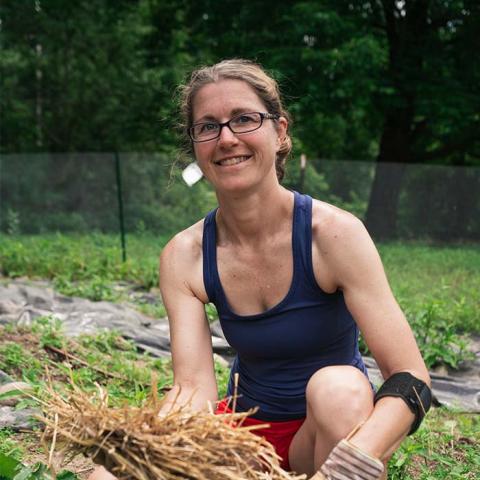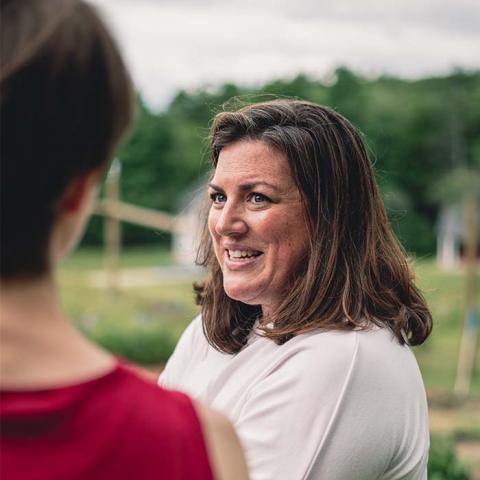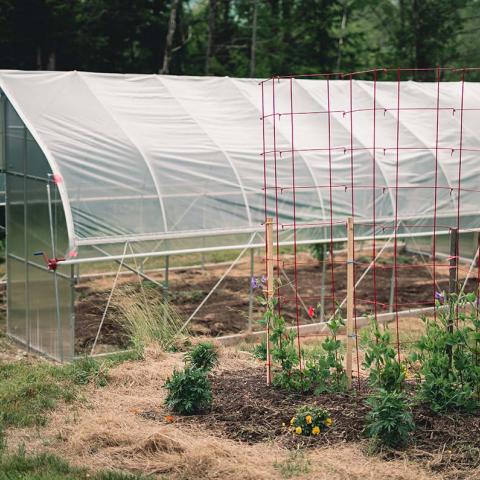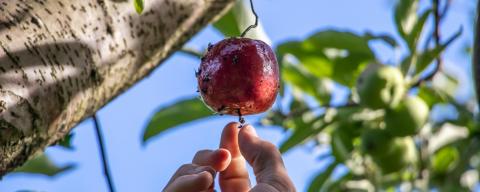New Farmer School Helps Granite Staters Start Their Own Businesses and Growing Operations
A local food movement has been gaining momentum in New England over recent years as people are giving high priority to fresh and healthy food, animal ethics and sovereignty over what chemicals are used in food production. New farmers have been joining the movement with a desire to become closer to nature while making a rewarding contribution to the health of their communities. These aspirations are poised to bring about positive change. However, the reality is that farming is a complicated venture, and, without educational support, farmers may feel exposed to deal with high expenses and production issues on their own.
To meet this need, UNH Cooperative Extension offers a course called New Farmer School, a program which made its debut in 2019. This course is designed for people who are brand new to farming or have some farming experience and would like to hone their growing and business practices. UNH recognizes that to be an effective farmer, expertise is needed in two areas: the science of agriculture and the practicalities of running a business.
That’s why this course includes the farming topics of soil science, land assessment, growing considerations and agricultural regulations alongside of entrepreneurial topics of financial record-keeping, marketing, insurance basics and availability of state loan agencies. Along the way, students have opportunities to network with other new farmers, go on field trips to farms and work closely with Extension staff to develop customized business and production plans.
Rena Caron Embraces Organic CSA Farming
Rena Caron graduated from New Farmer School in 2021 and now has six months of farming under her belt. After attending school for meteorology and working as a middle school science teacher for nineteen years, Caron decided that she wanted to start a farm. She grew up around various sized gardens, enjoying the idea of growing her own food.
Growing fresh local food with no chemicals, to be as healthy as possible, has become important to her. Appreciative of the value that fresh vegetables and fruits have in a healthy lifestyle, Rena is investing in her vision to provide produce to her community and educate others on healthy eating habits. She currently farms on her relative’s land in Atkinson and operates an organic CSA featuring a variety of fruits, vegetables and herbs like tomatoes, kale and basil. Caron recently became certified as a health coach and intertwines being a public health advocate with her CSA by writing pamphlets on health concerns such as added sugars or gut issues and providing recipes to use the weekly produce with CSA shares.
Farming happens to rely on the skills that Caron has built upon her whole career; meteorology helps her plant around weather concerns while teaching and health coaching helps her market nutrition education alongside her healthy food options. For extra preparation, Caron sought out New Farmer School and felt that the most helpful takeaways from the course were the ideas it gave her.
She explains, “The budget sheet, soil testing ideas, suppliers of seeds and tools from the New Farmer School were helpful – and learning about succession farming. They gave us some ideas on what websites to go to for having somebody help you find land.” Other helpful sessions included a talk from an insurance agent and information about crop schedules. She was able to begin networking with farmers –talking with farmers on field trips for New Farmer School gave her confidence to reach out to other CSA programs near Atkinson and make professional relationships.
If she can’t contribute a certain vegetable to the CSA basket, she can source it from another farmer she has networked with because she took the initiative to reach out. Caron’s future plans are to network with local schools to arrange farm visits for students to teach the next generation about farming and nutritious eating. UNH Extension wishes her the best of luck as she plans to expand her garden, build a hoop house and grow her CSA membership! If you would like to learn more about Caron’s farm you can visit her Instagram page: @rena_the_farmer
Jack and Carolina Harvey Create a Working Farm
Jack and Carolina Harvey, a father-daughter duo, graduated from New Farmer School in 2020. Carolina studied Spanish literature and worked in T.V. for a long time before attending law school. She now works full time in university grants administration. Jack is almost retired from working 43 years as an insurance broker for banks, lending money to Latin America. Their desire to start farming came from years being cooped up inside cubicles and wanting to reconnect with nature by making their family’s inherited farmland a working farm again.
While Jack has his heart set on owning a team of Oxen, he decided to invest in Carolina’s interest in flower arranging. This was a skill she picked up after attending Floret Flower Farm’s in-person workshop in Skagit Valley, Washington. Before attending New Farmer School, Jack and Carolina had two years of farming experience and sought out the course for more growing instruction. They currently operate Pumphouse Farm in Danbury, N.H. and sell flower bouquets at the Wilmot Farmers Market.
When asked about how New Farmer School impacted their current farming model, Jack explains that learning about soil management was his number one takeaway. With their garden situated on a recently logged piece of land, they are in the process of returning organic matter and nutrients to the disturbed soil. The slope of the land also creates a lot of water run-off that Jack has learned to manage.
In his words, “If you don’t have soil management you aren’t going anywhere.” He also appreciated the farm field trips. “On the business side, I think it was very helpful to see how people were running their farm, from a profit perspective, which we are not in a position to do yet.”
Carolina says, “Having the opportunity as part of the curriculum to think about the business aspect and fold that in with the more technical soil and pest management side was very insightful.” The class also made them aware of unexpected investments they would need to be prepared for. Jack and Carolina are thankful that these expenses were on their radar when their entire garden was wiped out by deer and an early frost. Luckily, they were financially prepared to install a tall deer fence and a high tunnel so that these disasters can be mitigated in future seasons.
“Right there are two big investments that we were aware of, because of the class; it just came faster than we anticipated,” says Jack, before explaining their plans to expand their farm to include another garden area. “And we know now — we are going to need a high tunnel three times that length and a fence twice as big.”
New Farmer School also strengthened Jack and Carolina’s connection to UNH Extension and introduced them to staff members who they have since heavily relied on. UNH’s Landscape and Greenhouse Field Specialist Jonathan Ebba visited their farm many times and his consultations helped them make crucial decisions about the high tunnel and its placement on their property. Ebba also tipped them off that their Japanese beetle issues were coming from weeds in the garden aisles, as the grass gives the beetles places to hide.
Most recently, Ebba was able to provide Jack and Carolina with a future vision for their farm as it continues to grow. He advised that they should begin networking with florists to find contract opportunities, which is something that Carolina is preparing to do in upcoming seasons. UNH Fruit and Vegetable Production Field Specialist Jeremy Delisle’s visits to the farm were very helpful when it came to growing advice in the garden.
Jack says, “I don’t see that we’d be as far along if it wasn’t for them.” Jack and Carolina plan to expand their flower gardens and start contracting orders out to florists. Carolina is also interested in providing flowers for weddings. If you are interested in learning more about their operation, Pumphouse Farm, you can visit their Instagram page: @pumphousefarm
Extension Services & Tools That Help NH Farmers Grow
Newsletters: Choose from our many newsletters for production agriculture
Receive Pest Text Alerts - Text UNHIPM to (866) 645-7010






